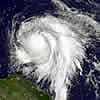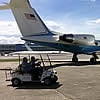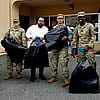As Rabbi Mendel Zarchi was rushing to make last-minute preparations for Rosh Hashanah services in the badly flooded synagogue where he and his family had taken refuge, he was not sure what exactly had occurred in the world around him on that final day of the Jewish year 5777.
Zarchi, co-director of Chabad of Puerto Rico with his wife, Rachel, had no Internet or phone connection for more than 14 hours, so he had no way of knowing the full impact of Hurricane Maria, which struck the island with a force that hadn’t been seen in a century.
When he finally was able to make a satellite phone call to a friend in Florida, he learned that the devastating storm had hit the U.S. territory with 155 mph winds. It knocked out electricity, cell phone and Internet service on the entire island; flooded roads, homes and buildings, especially in San Juan, which bore the brunt of the storm; and destroyed farms, buildings and entire towns. He could look outside the Chabad Jewish Center of Puerto Rico and see some of what that meant.
“The natural flow of water on Rosa Street, where Chabad is located, is towards the north in the direction of the ocean,” Zarchi tells Chabad.org. “At 5:30 a.m., there was a raging river with waves about 3 feet high flowing in the opposite direction towards the south.”
The synagogue was flooded with hundreds of gallons of water, he estimates. He stepped outside from his shelter and saw “blasted-out windows, toppled utility poles mangled with an overwhelming amount of downed trees, smashed cars . . . ripped-off roofs from nearby homes and major hotels, with massive commercial signs littering the roadways.”
“We were met by devastating destruction; a numbness and a daze [could] be seen over the faces of the few that ventured out at that time,” according to the rabbi.

‘Order to the Chaos’
Still, they decided to hold Rosh Hashanah services that night and were joined by a few neighbors. “We had a beautiful Yom Tov meal, and we all thanked G‑d for allowing us to enter into the new year after experiencing so much devastation,” states Zarchi.
Early the next morning, he walked down his street and witnessed a devastated tourist area.
“Hampton Inn wrecked, InterContinental [San Juan] a disaster, the Ritz-Carlton Hotel was covered with trees and parts of its missing roof. I was told they would need to close for repairs for some time,” he relates.
More than 10 people have died as a result of Maria, according to news reports. The island was already facing massive financial difficulties, declaring bankruptcy even before hurricane season.
“The main street was flooded and impassable; amidst all this, one person stopped to look around and amazingly chose to do something about it,” says Zarchi. “He bent down and started cleaning out the street drain, and the water started gushing into the drain, I was told he was still there an hour later working with the drain. What an inspiration—this person chose to take action and bring order to the chaos. Right there was fantastic sermon material.”
The center still had enough people to form a minyan on both days of Rosh Hashanah. The Zarchis were also able to provide food and beverages to guests.

“People walked in throughout the day for meals, to meet people, to chat and share their horror stories, and get some of the trauma out of the system,” says the rabbi.
After Rosh Hashanah and Shabbat, Zarchi says he still was having difficulty communicating with the outside world. There was also limited water and no power. Hotel and businesses were rationing fuel for generators.
“Supermarkets that are icons in the community are opening for limited hours due to limited supplies, and businesses that are open are limited to cash sales resulting from the system collapse. As such, there is increased looting and increasing desperateness,” he says.
The rabbi notes that a fund is in place, with Chabad directing financial support to go towards food and water for distribution, and for other essential supplies—namely, water trucks for potable water, and fuel and gas for generator usage. A 24-hour armed security guard is also needed at Chabad because of looting. Funds will also be used for center repairs not covered by insurance.

“Our heartfelt wishes for a G’mar Chasima Tova, a year filled with complete health and happiness with blessings for abundance to all,” says Zarchi. “With complete appreciation and admiration for the continued expressions of warmth and friendship by so many from every walk of Jewish life—humbling and inspiring.”
To donate to the Chabad recovery effort, visit the Chabad of Puerto Rico relief fund here.

![When Rabbi Mendel Zarchi, co-director of Chabad of Puerto Rico with his wife, Rachel, stepped out after Hurricane Maria had passed, “we were met by devastating destruction; a numbness and a daze [could] be seen over the faces of the few that ventured out at that time.” When Rabbi Mendel Zarchi, co-director of Chabad of Puerto Rico with his wife, Rachel, stepped out after Hurricane Maria had passed, “we were met by devastating destruction; a numbness and a daze [could] be seen over the faces of the few that ventured out at that time.”](https://w2.chabad.org/media/images/1026/GWYv10267158.jpg?_i=_n504BC99DD0473598AAE3BCDC5D75568D)






Start a Discussion